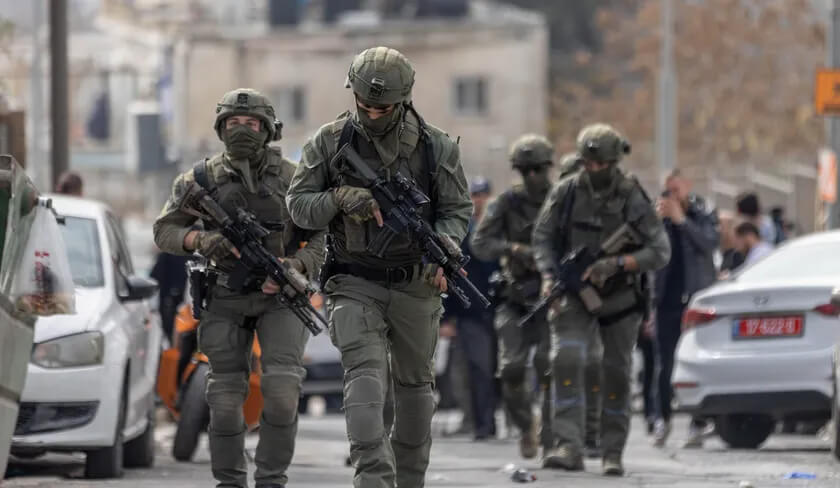With Jerusalem on the verge of erupting, Netanyahu must rein in his own coalition
Netanyahu will have to use all his experience to keep his cabinet from dragging Israel into another Gaza operation

Israeli Minister of National Security Itamar Ben-Gvir speaks to bystanders as he walks to the site of a reported attack in a settler neighborhood in Israeli-annexed East Jerusalem on Jan. 27, 2023. Photo by AHMAD GHARABLI/AFP via Getty Images
Less than a month after its creation, the new government has found itself at the threshold of a severe security crisis.
Although this current wave of terrorism began last March, under the previous government’s watch, and never really subsided, the attack in Jerusalem’s Neveh Yaakov neighborhood on Friday was the deadliest that Israel has experienced in around 15 years .
After the seven dead and five wounded Israelis on Friday night, we can now add a father and son who were shot and seriously wounded on Saturday in the City of David area in the city. The attacker was a 13-year-old Palestinian.
As has happened many times before, this pair of attacks is expected to be followed by a wave of copycat attempts. The atmosphere in Jerusalem has already been tense, in light of the relatively large number of incidents involving Palestinians and police, controversy over events at the Temple Mount, and a general sense that the Temple Mount could be the source of another eruption ahead of March and April, which will see Ramadan and Passover beginning and overlapping.

On Friday, the police announced that they were going to their highest alert level, and the military mobilized two battalions of paratroopers to the West Bank, where nine Palestinians were killed a day earlier during an arrest operation in Jenin that escalated into an exchange of fire with armed Palestinians, most of them members of Islamic Jihad.
Prime Minister Benjamin Netanyahu, who has been in such situations many times before, is well aware that security and calm isn’t achieved by ranting. If it’s even possible to put this violent genie back into the bottle, even for a little while, this would require the reinforcement and proper deployment of forces, based on the latest intelligence provided by the Shin Bet and carefully managing the crisis without being guided by the widespread calls for revenge.
But these aren’t normal times. Netanyahu began his current term with a legislative blitz aimed at altering the judicial system. A broad public opposition is forming before his eyes, and he’s increasingly dependent on his new political partners to pass his legislation.
If the circumstances weren’t so tragic, one could even find comedy in National Security Minister Itamar Ben-Gvir’s embarrassing wriggling when he, like many times in the past, visited at the scene of the attack on Friday. This time, he seemed surprised to discover that the residents of Neveh Yaakov considered him responsible for the situation and for solving it.
The security cabinet is scheduled to meet Saturday evening to discuss the situation in the West Bank and Jerusalem. Netanyahu will have to gather all his experience and intelligence to prevent the leaders of some of the factions in his coalition from dragging him into a wider military conflict, which would probably not lead to a better outcome. The leaders of the defense establishment will present concrete operational options in the hope that those ministers will be satisfied and don’t call for drastic measures in the name of national honor.
Meanwhile, amid public and political pressure, futile moves are already being made. The police proudly announced that it had arrested 42 neighbors and relatives of the assailant in the Neveh Yaakov attack. It’s obvious to all that there’s no connection between this number and deciphering further details about the attack, like who knew about his plans and who was an accomplice.
The immediate risks
The ongoing series of events began on Thursday morning with the operation in Jenin, which was based on a general state of alertness about plans for a terror attack and wasn’t intended, as reported in some media outlets, to stop an imminent one from occurring.
After the deaths of its people, it was clear that Islamic Jihad in the Gaza Strip would see itself obligated to have an appropriate response. They didn’t time their rockets to coincide with evening news and didn’t target the center of the country, but rather fired at midnight at Ashkelon and the communities near the Gaza border area. There were no casualties thanks to the interception capabilities of the Iron Dome.
Hamas, which authorized Islamic Jihad’s response, found a way to participate in the attack when it fired anti-aircraft missiles at Israel Air Force aircraft, which engaged Hamas targets in the Gaza Strip in response. Eventually, Hamas prevented a more drastic response by Islamic Jihad for the same familiar explanations.
It seems that, at least at the moment, Hamas has no interest in another military clash with Israel. It continues to build its military abilities and is happy to benefit from the taxes on the salaries of some 17,000 Gazan workers who have been allowed to work in Israel since the Bennet-Lapid government.
And still, it should be noted that the Shin Bet consistently uncovers Hamas’ attempts to attack Israelis through its members in the West Bank and the entry of Gazan workers into Israel. According to sources in the Shin Bet, concerns can be heard in the security establishment that warn of a potential growing misconception, according to which Hamas is interested in long-term calm.
While Gaza may join the next military clash with Israel, if and when it happens, the immediate risks lie in the terror attacks coming out of the West Bank and in the growing religious tensions around the complex situation at the Temple Mount.
The attacker from the Neveh Yaakov shooting is already being hailed as a national hero in East Jerusalem and the West Bank. In many Palestinian cities, there were celebrations over the massacre of defenseless civilians who were shot near a synagogue. These will inspire more young people to do the same, and the next few days are exceptionally critical.
Even more so than in recent years, the security establishment is operating under the possibility of a major turn of events, a possible dramatic incident leading to an all-out explosion in the form of a third intifada. This hasn’t happened yet mainly because the hundreds of young people carrying out the attacks weren’t joined by a large mass of supporters who came out to the streets looking to clash with Israelis.
Now it seems that the necessary ingredients for the next explosion are gradually accumulating. It’s no surprise that the Biden administration is sending over his senior officials. Along with the justified concern in Washington about the new government’s attempts to change the rules of democracy, the Americans are extremely disturbed by the prospect of a widespread flare-up in the Palestinian arena.
Michael Milshtein, a researcher of Palestinian studies at Tel Aviv University and Reichmann University, told Haaretz that Israel should try to take advantage of U.S. Secretary of State Anthony Blinken’s visit to the region early next week to convince the Palestinian Authority to cancel its suspension of security coordination. The authority’s decision, which was essentially declarative, was made on Thursday in protest of the operation in Jenin.
Milshtein described Netanyahu’s visit to Jordan earlier last week as an appropriate step and recommended trying to court more moderate Arab countries, such as Egypt and Morocco, in an effort to calm the atmosphere ahead of Ramadan.
This article originally appeared on Haaretz.com. To get Haaretz’s Daily Brief newsletter delivered to your inbox, click here.
















